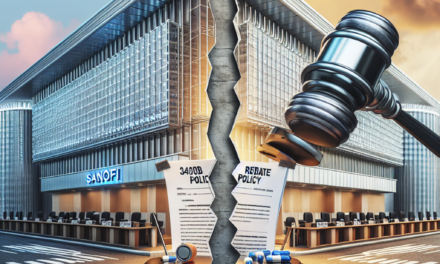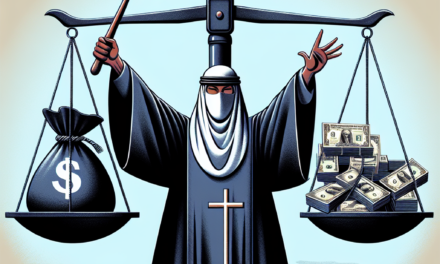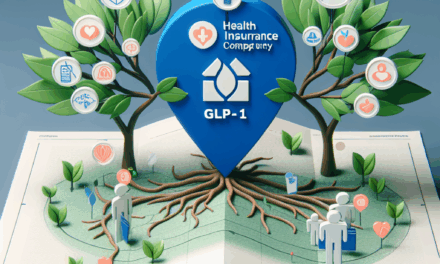Healthcare Sector Prepares for RFK Jr.’s Impact
As the healthcare landscape continues to evolve, the potential impact of public figures on health policy and public perception cannot be underestimated. One such figure is Robert F. Kennedy Jr. (RFK Jr.), a prominent environmental attorney and activist known for his controversial views on vaccines and public health. His recent foray into politics has raised questions about how the healthcare sector is preparing for his influence. This article delves into the implications of RFK Jr.’s activism on healthcare, exploring various facets of the sector’s response.
1. Understanding RFK Jr.’s Position on Vaccines
RFK Jr. has long been a vocal critic of vaccines, claiming a link between vaccines and various health issues, including autism. His stance has garnered a significant following, particularly among parents concerned about vaccine safety. This section examines the origins of his views, the scientific community’s response, and the implications for public health.
1.1 The Origins of RFK Jr.’s Vaccine Advocacy
RFK Jr.’s vaccine skepticism can be traced back to his early involvement in environmental activism, where he focused on the impact of industrial pollutants on health. His concerns about mercury in vaccines, particularly thimerosal, have been a cornerstone of his argument. Despite extensive research debunking the vaccine-autism link, RFK Jr. has maintained his position, often citing anecdotal evidence and personal stories.
1.2 The Scientific Community’s Response
The scientific community has largely rejected RFK Jr.’s claims, emphasizing that vaccines are safe and effective. Numerous studies, including large-scale epidemiological research, have found no causal relationship between vaccines and autism. Organizations such as the Centers for Disease Control and Prevention (CDC) and the World Health Organization (WHO) have consistently advocated for vaccination as a critical public health measure.
1.3 Public Perception and Vaccine Hesitancy
RFK Jr.’s influence has contributed to a growing vaccine hesitancy among certain populations. According to a 2021 survey by the Kaiser Family Foundation, approximately 23% of adults expressed concerns about vaccine safety, a sentiment that has been exacerbated by misinformation spread through social media. This hesitancy poses a significant challenge to public health efforts aimed at achieving herd immunity.
1.4 Case Studies: The Impact of Vaccine Misinformation
Several case studies illustrate the consequences of vaccine misinformation. For instance, the measles outbreak in 2019 in the United States was largely attributed to declining vaccination rates fueled by anti-vaccine rhetoric. The outbreak resulted in over 1,200 cases, highlighting the real-world implications of vaccine hesitancy.
1.5 Preparing for Future Challenges
In response to RFK Jr.’s influence, healthcare organizations are ramping up efforts to combat misinformation. Strategies include:
- Enhancing public education campaigns about vaccine safety.
- Engaging with community leaders to build trust in vaccination programs.
- Utilizing social media platforms to disseminate accurate information.
2. The Role of Social Media in Shaping Health Narratives
Social media has become a powerful tool for disseminating information, but it also serves as a breeding ground for misinformation. RFK Jr.’s use of platforms like Twitter and Instagram to share his views has amplified his message and reached a broad audience. This section explores the dynamics of social media in health communication.
2.1 The Rise of Health Influencers
Health influencers, including RFK Jr., have gained significant traction on social media, often overshadowing traditional health communication channels. Their ability to connect with audiences on a personal level allows them to build trust and credibility, even when their claims lack scientific backing. This phenomenon raises questions about the effectiveness of conventional public health messaging.
2.2 Misinformation and Its Consequences
The spread of misinformation on social media can have dire consequences for public health. A study published in the journal “Health Affairs” found that misinformation about COVID-19 vaccines led to increased vaccine hesitancy and lower vaccination rates. The rapid dissemination of false information can undermine public trust in health authorities and hinder efforts to control outbreaks.
2.3 Strategies for Countering Misinformation
To combat misinformation, healthcare organizations are adopting various strategies, including:
- Collaborating with social media platforms to flag false information.
- Creating shareable content that highlights accurate health information.
- Training healthcare professionals to engage with patients on social media.
2.4 Case Studies: Successful Social Media Campaigns
Several public health campaigns have successfully utilized social media to counter misinformation. For example, the CDC’s “Vaccinate with Confidence” campaign aimed to build trust in vaccines through targeted messaging and community engagement. By leveraging social media influencers, the campaign reached diverse audiences and effectively communicated the importance of vaccination.
2.5 The Future of Health Communication
As social media continues to evolve, healthcare organizations must adapt their communication strategies. This includes:
- Investing in digital literacy programs to help the public discern credible information.
- Utilizing data analytics to understand audience behavior and preferences.
- Engaging in proactive communication to address emerging health concerns.
3. Legislative Implications of RFK Jr.’s Political Aspirations
RFK Jr.’s entry into politics has raised concerns about potential legislative changes that could impact public health policy. This section examines the implications of his political aspirations on healthcare legislation and public health initiatives.
3.1 The Political Landscape and Vaccine Policy
The political landscape surrounding vaccine policy has become increasingly polarized. RFK Jr.’s candidacy may embolden anti-vaccine sentiments among certain political factions, potentially leading to legislative efforts aimed at rolling back vaccination mandates. This shift could have significant repercussions for public health, particularly in the context of infectious disease outbreaks.
3.2 Case Studies: Legislative Changes in Vaccine Policy
Several states have seen legislative changes in response to anti-vaccine activism. For instance, California’s SB 277, which eliminated personal belief exemptions for vaccines, faced significant opposition from anti-vaccine groups. The ongoing debate highlights the tension between public health imperatives and individual rights.
3.3 The Role of Advocacy Groups
Advocacy groups play a crucial role in shaping health policy. Organizations such as the National Vaccine Information Center (NVIC) have mobilized grassroots efforts to influence legislation. RFK Jr.’s involvement with such groups may further amplify their message and impact policy discussions at the state and national levels.
3.4 Preparing for Legislative Challenges
In anticipation of potential legislative challenges, healthcare organizations are focusing on advocacy efforts to protect vaccination mandates. Strategies include:
- Building coalitions with other public health organizations.
- Engaging with lawmakers to provide evidence-based information on vaccine efficacy.
- Mobilizing community support for vaccination initiatives.
3.5 The Future of Public Health Legislation
The future of public health legislation will likely be shaped by ongoing debates about individual rights versus community health. As RFK Jr. continues to influence public discourse, healthcare organizations must remain vigilant and proactive in advocating for policies that prioritize public health.
4. The Economic Impact of Vaccine Hesitancy
Vaccine hesitancy not only poses a public health risk but also has significant economic implications. This section explores the economic consequences of declining vaccination rates and the potential costs associated with outbreaks of vaccine-preventable diseases.
4.1 The Cost of Outbreaks
Outbreaks of vaccine-preventable diseases can lead to substantial economic costs, including healthcare expenses, lost productivity, and increased insurance premiums. For example, the 2014-2015 measles outbreak in the U.S. resulted in an estimated $2.7 million in direct medical costs, not to mention the broader economic impact on affected communities.
4.2 The Burden on Healthcare Systems
Increased vaccine hesitancy can strain healthcare systems, leading to overcrowded emergency rooms and increased demand for medical services. A study published in the “American Journal of Public Health” found that vaccine-preventable diseases can lead to significant healthcare costs, particularly during outbreaks when resources are stretched thin.
4.3 The Role of Employers in Promoting Vaccination
Employers play a critical role in promoting vaccination among their workforce. By implementing workplace vaccination programs, employers can help reduce the economic burden of vaccine-preventable diseases. Studies have shown that workplace vaccination initiatives can lead to increased vaccination rates and decreased absenteeism.
4.4 Case Studies: Successful Employer Vaccination Programs
Several companies have successfully implemented vaccination programs to protect their employees and reduce healthcare costs. For instance, a large healthcare organization in Texas reported a 20% increase in flu vaccination rates among employees after launching an on-site vaccination clinic. This initiative not only improved employee health but also reduced healthcare costs associated with flu-related illnesses.
4.5 Strategies for Mitigating Economic Impact
To mitigate the economic impact of vaccine hesitancy, stakeholders can adopt various strategies, including:
- Investing in public health campaigns that emphasize the economic benefits of vaccination.
- Encouraging employers to offer incentives for vaccination.
- Collaborating with insurance companies to reduce costs associated with vaccine-preventable diseases.
5. Building Trust in Public Health Institutions
Trust in public health institutions is essential for effective health communication and vaccination efforts. RFK Jr.’s influence has raised concerns about declining trust in these institutions, necessitating a concerted effort to rebuild confidence among the public. This section explores strategies for fostering trust in public health.
5.1 The Importance of Transparency
Transparency is a key factor in building trust in public health institutions. Providing clear and accessible information about vaccine safety, efficacy, and the decision-making processes behind public health recommendations can help alleviate concerns. Public health agencies must prioritize transparency in their communication efforts.
5.2 Engaging Communities in Decision-Making
Engaging communities in public health decision-making can foster a sense of ownership and trust. By involving community leaders and stakeholders in discussions about vaccination policies, public health agencies can build relationships and address concerns more effectively. This approach has been successful in various public health initiatives, including maternal and child health programs.
5.3 Addressing Historical Mistrust
Historical mistrust of public health institutions, particularly among marginalized communities, poses a significant barrier to vaccination efforts. Acknowledging past injustices and actively working to address disparities in healthcare access can help rebuild trust. Initiatives that prioritize equity and inclusivity are essential for fostering confidence in public health.
5.4 Case Studies: Successful Trust-Building Initiatives
Several public health campaigns have successfully built trust within communities. For example, the “We Can Do This” campaign launched by the Biden administration aimed to engage communities of color in vaccination efforts. By partnering with trusted community organizations, the campaign effectively communicated the importance of vaccination and addressed concerns about vaccine safety.
5.5 The Future of Public Health Trust
As RFK Jr.’s influence continues to shape public discourse, rebuilding trust in public health institutions will be crucial. Strategies for fostering trust include:
- Implementing community-based participatory research to involve communities in health initiatives.
- Providing ongoing education and training for healthcare professionals on effective communication strategies.
- Utilizing data-driven approaches to assess and address community concerns.
Conclusion
The healthcare sector is at a critical juncture as it prepares for the potential impact of RFK Jr.’s activism on public health policy and vaccine acceptance. Understanding his position on vaccines, the role of social media, legislative implications, economic consequences, and the importance of trust in public health institutions are essential for navigating this complex landscape.
As vaccine hesitancy continues to pose challenges, healthcare organizations must adopt proactive strategies to combat misinformation, engage communities, and advocate for sound public health policies. By fostering trust and transparency, the healthcare sector can work towards a future where vaccination is embraced as a vital component of public health.
Ultimately, the response to RFK Jr.’s influence will shape the future of healthcare in the United States, underscoring the need for collaboration, education, and a commitment to evidence-based practices. The stakes are high, and the healthcare sector must rise to the occasion to protect public health and ensure the well-being of communities across the nation.




